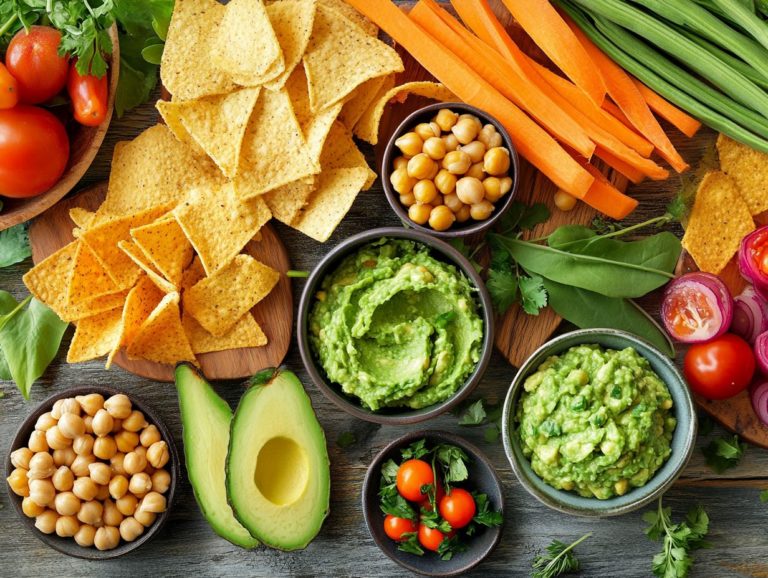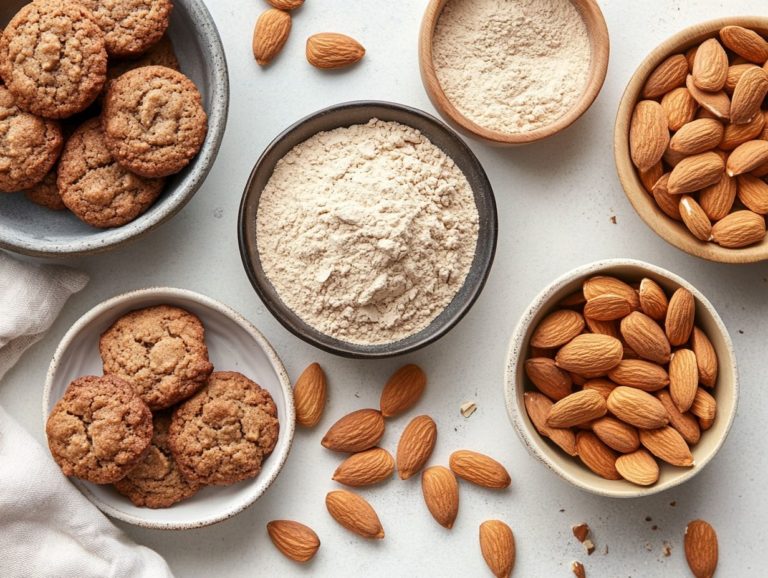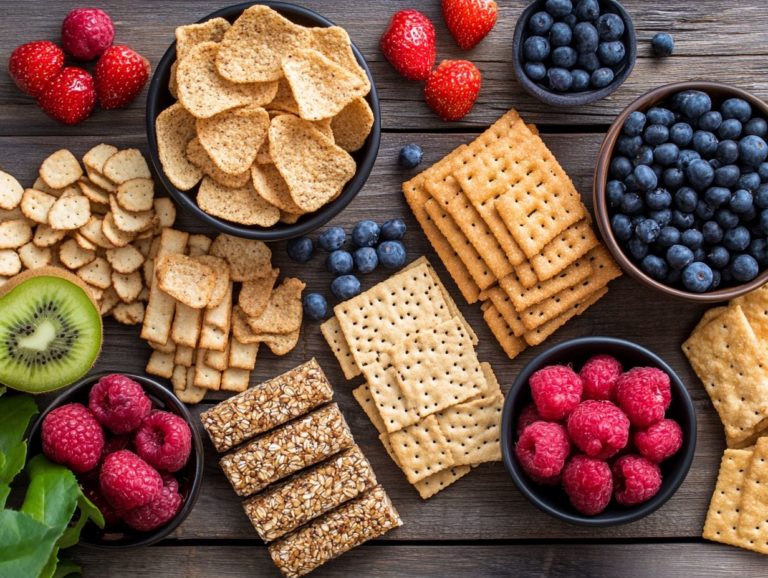Do Gluten-Free Snacks Have to Be Processed?
If you ve ever found yourself pondering the role of gluten in your diet, know that you re in good company. With gluten-free diets gaining traction and an increasing awareness surrounding processed foods, many are embarking on the journey of navigating these dietary choices.
This article will delve into the essence of gluten, uncover the foods that harbor it, and illuminate the motivations fueling the gluten-free movement. It will also address processed foods, weighing their benefits and risks, while guiding you on how to select healthy gluten-free snacks that maintain high quality.
Get ready to boost your knowledge and take charge of your diet!
Contents
- Key Takeaways:
- Understanding Gluten
- What Is a Gluten-Free Diet?
- What Are the Benefits of Processed Foods?
- What Are the Risks of Processed Foods?
- Do All Gluten-Free Snacks Have to Be Processed?
- What Are Some Examples of Processed Gluten-Free Snacks?
- Are There Any Gluten-Free Snacks That Are Not Processed?
- How to Choose Healthy Gluten-Free Snacks?
- Look for Whole Food Ingredients
- Avoid Added Sugars and Artificial Ingredients
- Frequently Asked Questions
- Do Gluten-Free Snacks Have to Be Processed?
- What does it mean for a snack to be “gluten-free”?
- Are all gluten-free snacks processed in the same way?
- Can gluten-free snacks still be considered “healthy” if they are processed foods?
- Is it safe to assume that all gluten-free snacks are processed for those with celiac disease or gluten sensitivity?
- Are there any potential risks associated with consuming processed gluten-free snacks?
Key Takeaways:
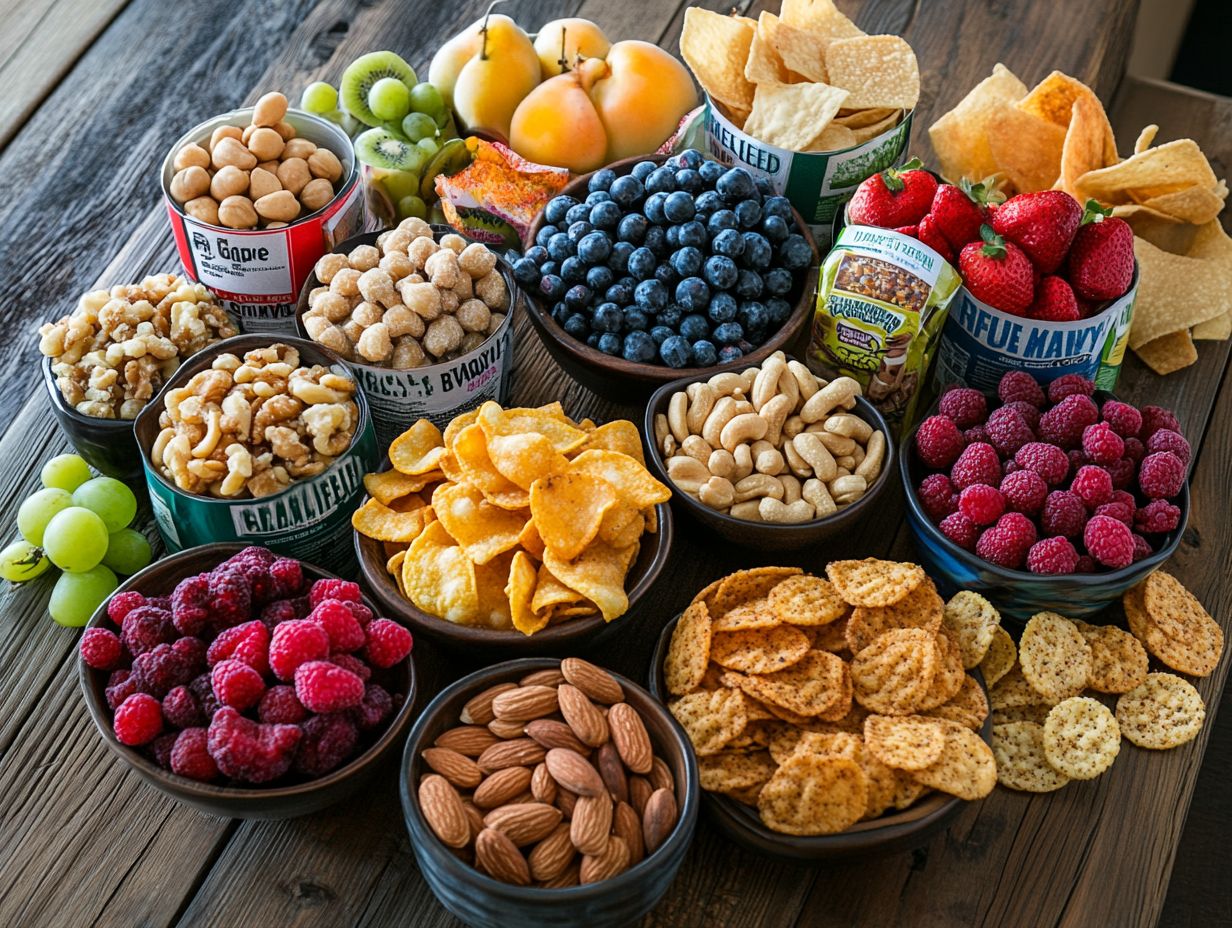
- Not all gluten-free snacks are processed, but many are. It’s important to read labels carefully and choose snacks made with whole food ingredients to avoid added sugars and artificial ingredients.
- A gluten-free diet is not necessary for everyone, but those with celiac disease or gluten intolerance may benefit. Some processed gluten-free snacks may have added health risks, so it’s important to choose wisely.
- Processed foods have both benefits and risks, but it’s possible to find healthy gluten-free snack options. Look for snacks with protein and fiber, avoid added sugars and artificial ingredients, and read labels carefully to make informed choices.
Understanding Gluten
Gluten comprises a group of proteins predominantly found in grains like wheat, barley, and rye. It can trigger a range of health issues for those with gluten sensitivity, celiac disease, or gluten ataxia. These proteins are responsible for the elasticity of dough, allowing it to rise and hold its shape, making them prevalent in both processed foods and whole grains.
If you have dietary restrictions or autoimmune disorders, the presence of gluten in food products can pose serious health risks. This underscores the importance of meticulous meal planning and a keen awareness of gluten-containing ingredients.
What Foods Contain Gluten?
Foods containing gluten mainly include those crafted from wheat, barley, and rye, such as bread, pasta, and a plethora of processed items. These gluten-laden ingredients can often sneak into sauces, dressings, and even snacks. It is essential for you, especially if you have gluten intolerance or celiac disease, to scrutinize food labels meticulously to prevent any unintended intake.
Beyond the obvious culprits like baked goods and cereals, gluten can also be found in some surprising places. These include certain soy sauces, malt beverages, and even select flavored coffees. Being aware of mixing with gluten-containing foods is vital; using the same utensils or surfaces for both gluten-containing and gluten-free foods can introduce a significant risk.
From a health perspective, consuming gluten can lead to a spectrum of symptoms ranging from mild digestive discomfort to more severe reactions. This highlights the importance of staying vigilant in monitoring your food choices and ensuring they align with your dietary needs.
What Is a Gluten-Free Diet?
A gluten-free diet is comprised of foods and alternatives that are entirely free from gluten. This is a necessity for those diagnosed with celiac disease, gluten sensitivity, or wheat allergies.
By removing gluten-containing ingredients from your meals often lurking in processed foods you can enhance your health and sidestep the complications tied to gluten intolerance.
This approach prioritizes natural foods, including fruits, vegetables, lean meats, and gluten-free grains like rice and quinoa. This allows you to maintain a balanced nutritional intake while catering to your specific dietary requirements.
Why Do People Choose to Follow a Gluten-Free Diet?
You may choose to follow a gluten-free diet for a variety of compelling reasons, most notably for managing health conditions like celiac disease, gluten sensitivity, and other autoimmune disorders. For you, consuming gluten can lead to serious health issues, including digestive problems, nutrient deficiencies, and complications that significantly diminish your quality of life.
A gluten-free diet helps reduce these symptoms and encourages healthier eating by promoting the consumption of whole grains, fruits, vegetables, and lean proteins.
Your motivations might extend beyond mere symptom management. Many find that eliminating gluten enhances mental clarity and emotional well-being. This psychological shift often accompanies physical relief, creating a positive feedback loop that reinforces your commitment to this new dietary approach.
Engaging with a community of like-minded individuals can provide invaluable support, shared recipes, and creative solutions. You can enjoy inclusivity and fulfillment while adhering to your dietary restrictions.
Is a Gluten-Free Diet Necessary for Everyone?
While adopting a gluten-free diet is vital for those with celiac disease, gluten intolerance, or wheat allergies, it s not a necessity for everyone. Many people without these conditions enjoy gluten-containing foods without any negative effects.
In fact, cutting gluten from your diet without proper management could lead to nutritional deficiencies.
Some may choose to go gluten-free for perceived health benefits or to follow dietary trends. This prompts important questions about the necessity and implications of such restrictions for the general population.
This rising trend often stems from misconceptions about gluten. Many believe that gluten-free foods are automatically healthier.
The truth is that for those who don’t have gluten-related disorders, the supposed benefits of a gluten-free lifestyle might be exaggerated.
By avoiding gluten without specific health conditions that require a gluten-free diet, you could be missing out on essential nutrients typically found in whole grains, including B vitamins and fiber.
It’s crucial to understand now that while a gluten-free diet can be a vital choice for some, the broader population should carefully weigh their options and consider the potential advantages of a balanced diet that includes gluten unless specific health issues dictate otherwise.
What Are Processed Foods?
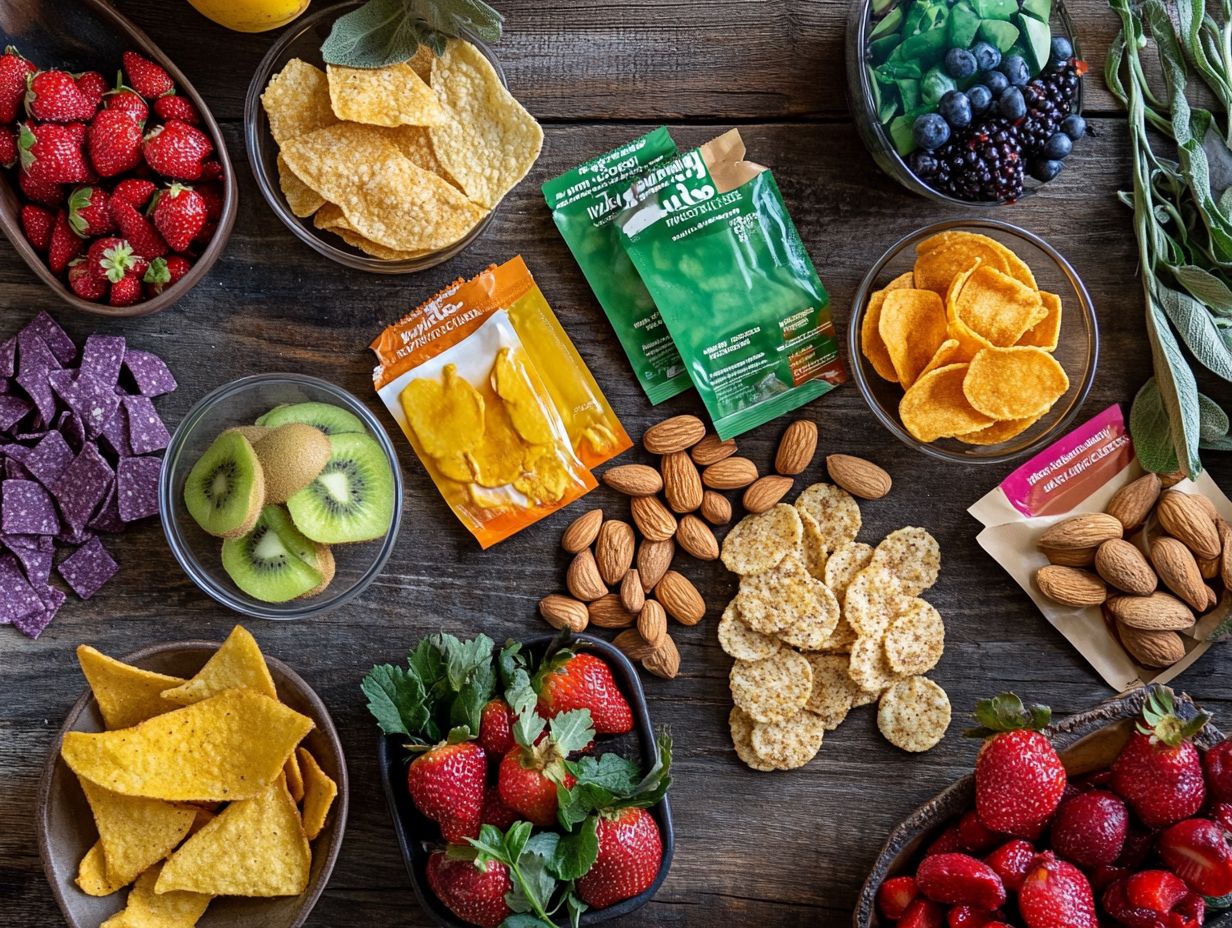
Processed foods are those that have undergone alterations from their natural state to enhance safety, convenience, or flavor, often through techniques like freezing, canning, or the addition of preservatives.
While it s true that some processed options can fit seamlessly into a healthy diet, others may be laden with unhealthy levels of added sugars, sodium, and gluten-containing ingredients.
This can pose significant challenges for individuals making dietary adjustments, especially those following a gluten-free regimen. By grasping the nutritional content of processed foods, you give yourself the power to make informed choices and pinpoint gluten-free products that align perfectly with your health aspirations.
What Are the Benefits of Processed Foods?
Processed foods present a range of benefits, including convenience, extended shelf life, and the ability to provide dietary supplements that can enhance your nutritional intake. For busy individuals or families, these foods simplify meal preparation and planning, allowing for quick access to satisfying meals and snacks. Make it a priority to choose products wisely, focusing on those that provide nutritional benefits without compromising your healthy diet.
This means seeking out nutrient-rich options that not only quell your hunger but also support your overall health. Many processed foods are fortified with vitamins and minerals, making them a practical choice for boosting your dietary intake.
However, if you re following a gluten-free lifestyle, it’s crucial to scrutinize ingredient labels meticulously. Some processed items may harbor additives or hidden sources of gluten that could derail your well-intentioned dietary goals.
Ultimately, the key is to find a balance prioritizing accessible meals that align with your health objectives while adhering to the guidelines of your specific dietary needs.
What Are the Risks of Processed Foods?
While processed foods may offer a tempting level of convenience, they come with significant risks that you should consider. These risks include unhealthy additives, high levels of sodium, sugar, and unhealthy fats, all of which can lead to nutrient deficiencies and various health issues.
If you have dietary restrictions, particularly avoiding gluten, you face the added challenge of finding options that uphold your health without sacrificing convenience. The abundance of processed gluten-free products means you need to scrutinize ingredient lists carefully to avoid mixing with gluten-containing foods and ensure they meet your dietary needs.
Many gluten-free snacks and meals can be heavily processed and devoid of essential nutrients, which may contribute to an imbalanced diet. Relying solely on these products might unknowingly amplify cravings for unhealthy foods and diminish your overall well-being.
Make it a priority to choose whole, minimally processed foods whenever possible. By diligently reading labels and making informed choices, you can steer clear of harmful ingredients while still enjoying safe, flavorful meals.
Educating yourself about nutrition and the effects of your dietary choices is essential to maintaining your health and vitality.
Do All Gluten-Free Snacks Have to Be Processed?
Not all gluten-free snacks need to come from a factory; in fact, you ll discover that many natural foods are exceptional gluten-free choices that are both nutritious and utterly satisfying.
Fresh fruits, vibrant vegetables, wholesome nuts, and seeds offer remarkable health benefits without the pitfalls of processed snacks, making them perfect for anyone following a gluten-free diet. By emphasizing whole foods, you not only boost your nutrient intake but also steer clear of the questionable additives often lurking in processed options.
What Are Some Examples of Processed Gluten-Free Snacks?
Try exciting processed gluten-free snacks like gluten-free pretzels, granola bars, and packaged chips made just for you! While these snacks provide convenience and help satisfy cravings, you should scrutinize the labels for gluten-free certifications and nutritional content to ensure they meet your health goals.
Many brands have risen to the occasion, offering flavorsome alternatives like quinoa puffs, rice cakes, and popcorn seasoned with natural ingredients. These snacks give you the power to adhere to your dietary requirements without compromising on taste or convenience.
As you navigate the gluten-free snack aisle, keep an eye out for items fortified with vitamins and minerals, particularly those featuring nut butters or seeds, which can contribute protein and healthy fats to your diet.
Remaining vigilant about added sugars and artificial ingredients will guide you in selecting nutrient-dense choices that not only support your gluten-free lifestyle but also enhance your overall health.
Explore your options now and embrace a healthier, gluten-free lifestyle!
Are There Any Gluten-Free Snacks That Are Not Processed?
Indeed, you ll find a wealth of gluten-free snacks that are refreshingly unprocessed, including fresh fruits, vegetables, nuts, and yogurt. These whole foods not only steer clear of gluten-containing ingredients but also boast an abundance of vitamins, minerals, and fiber. They make a superb complement to any healthy diet.
Choosing a variety of these options bolsters your overall well-being by providing essential nutrients often sacrificed in processed foods. For instance, fresh berries are packed with antioxidants that help strengthen your immune system. Crunchy vegetables like carrots and bell peppers deliver fiber that aids digestion. Nuts are a powerhouse of healthy fats and protein that support heart health, while yogurt offers probiotics that enhance gut flora.
By choosing these whole, gluten-free snacks, you elevate your nutritional value and cultivate sustainable eating habits that encourage long-term health.
How to Choose Healthy Gluten-Free Snacks?
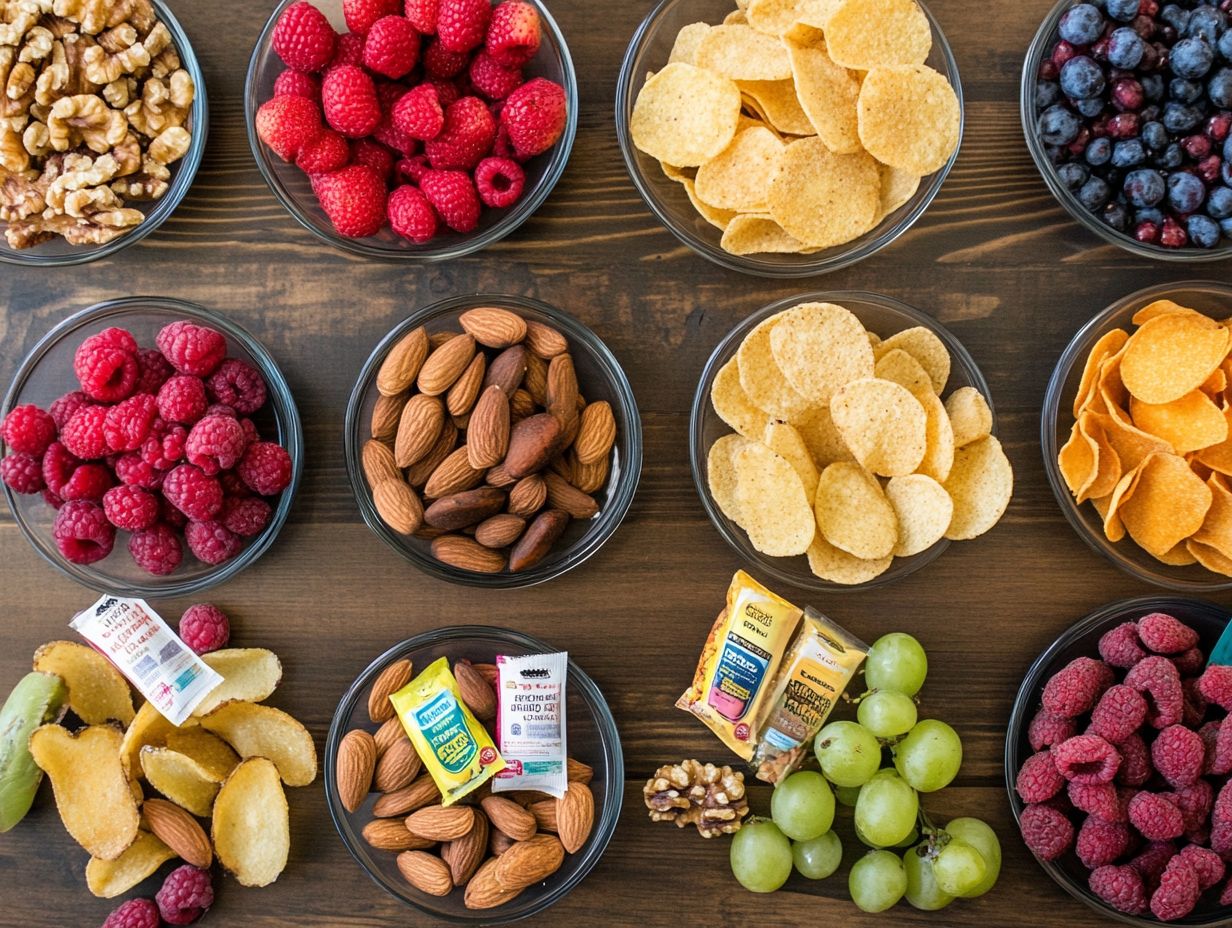
When selecting healthy gluten-free snacks, prioritize options that focus on whole food ingredients and provide nutrient-rich alternatives. Avoid snacks filled with added sugars or artificial components; instead, choose those high in protein and fiber.
Examine food labels meticulously to ensure your snacks align with your dietary needs while promoting a healthy lifestyle.
Look for Whole Food Ingredients
When selecting gluten-free snacks, prioritize options that feature whole food ingredients like fruits, vegetables, nuts, and seeds. These choices are naturally gluten-free and pack a nutritional punch, making them satisfying and beneficial for your overall health.
For example, choosing raw almonds or a blend of pumpkin seeds can offer protein and healthy fats, helping keep your energy levels steady throughout the day. Fresh fruits like apple slices or berries provide fiber and antioxidants that support immune function and digestion.
On the other hand, processed snacks often come loaded with additives and refined sugars that can cause unsettling blood sugar spikes and crashes, impacting your mood and energy levels. Opting for snacks rich in whole foods not only gives you a more nutritious diet but also helps you achieve improved satiety and better long-term health outcomes.
Avoid Added Sugars and Artificial Ingredients
When selecting gluten-free options, avoid snacks loaded with added sugars and artificial ingredients. Many products on the market try to mimic traditional snacks but often come with unhealthy additives. Seek out gluten-free snacks free from these harmful components to support your overall health.
Always scrutinize labels, as some snacks may use deceptive terms like “natural flavors” or “healthy sweeteners” that can still lead to excessive sugar intake. Choose snacks with whole food ingredients, like nuts, seeds, or dried fruits. These satisfy cravings and deliver essential nutrients.
Look for brands transparent about their sourcing and formulations, clearly listing all ingredients. Incorporating simpler snacks like homemade kale chips or yogurt topped with fresh fruit can help curb cravings while keeping your diet balanced and aligned with gluten-free living.
Start exploring these delicious gluten-free snacks today and discover your favorites! Share your go-to options in the comments below.
Choose Snacks with Protein and Fiber
Selecting gluten-free snacks that are high in protein and fiber is essential for keeping you full and maintaining a balanced nutrient intake. Opt for snacks like nuts, seeds, and certain gluten-free bars. These options provide the necessary macronutrients to help keep your energy levels stable throughout the day.
Incorporating these nutrient-dense snacks into your regular eating habits can significantly enhance your overall wellness. For instance, almonds deliver a hearty dose of protein and are packed with fiber. This combination effectively curbs hunger between meals.
Similarly, snacks like chickpea crisps or edamame offer a crunchy, satisfying option that s loaded with both protein and fiber.
By making these choices, you can elevate your snacking routine while supporting your digestive health and regulating your blood sugar levels. This is an easy and tasty way to meet your daily nutrient needs without compromising on taste or your dietary requirements.
Read Labels Carefully
Always keep an eye on food labels; they are your best friend when choosing gluten-free snacks. This diligence ensures that your selections are free from gluten-containing ingredients and mitigates the risk of cross-contamination. Always look for certified gluten-free labels and scrutinize ingredient lists to avoid hidden sources of gluten that could compromise your health.
It s also crucial to be vigilant about potential allergens in processed foods. Snacks produced in facilities that handle gluten-containing products can pose a significant risk. Prioritize brands that transparently communicate their manufacturing processes.
Be cautious of ingredients like malt, which may originate from barley. These are common pitfalls for those on a gluten-free diet. Understanding phrases like “gluten-free” and “may contain traces of gluten” is essential, as they can significantly impact your overall well-being.
Frequently Asked Questions
Do Gluten-Free Snacks Have to Be Processed?
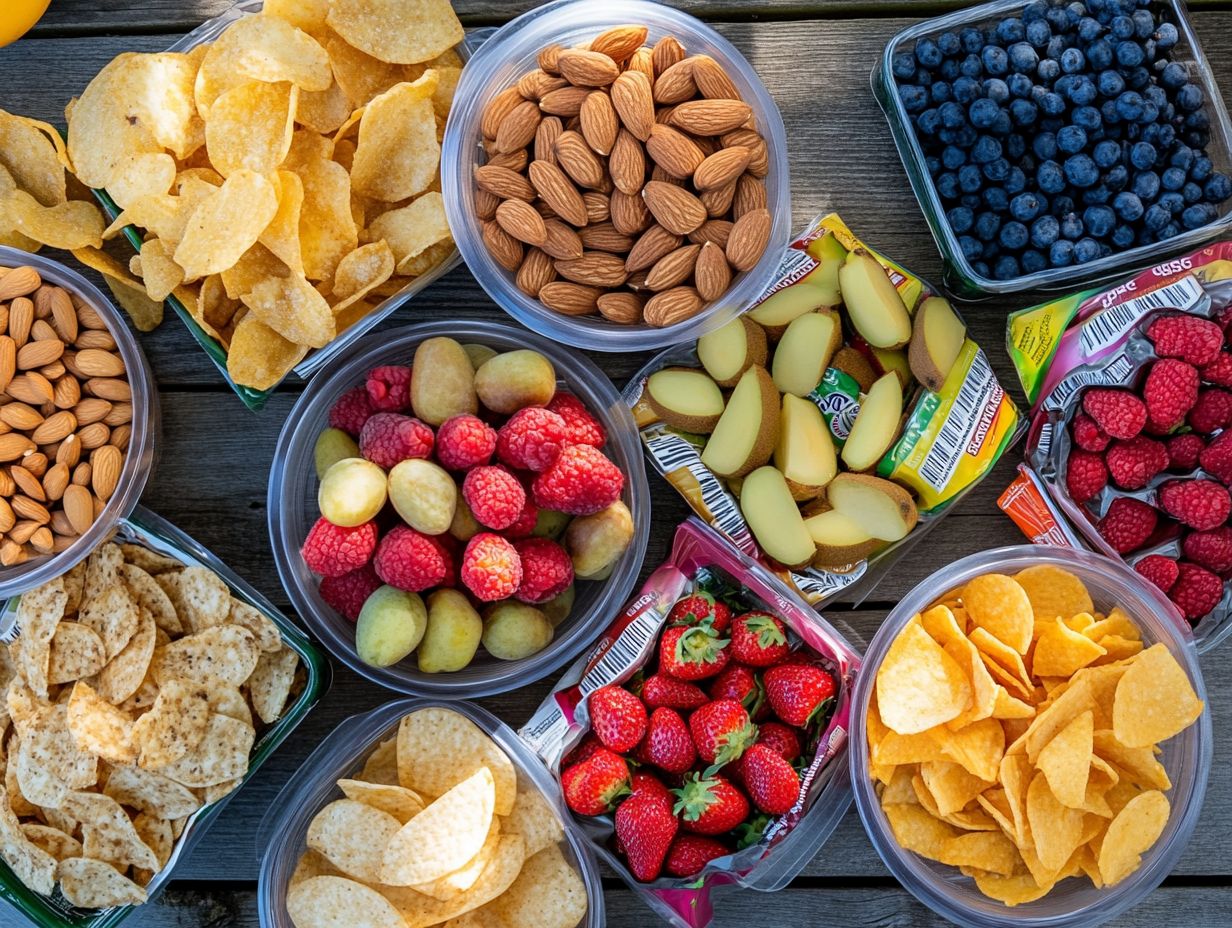
Yes, gluten-free snacks often undergo some form of processing to remove gluten-containing ingredients and ensure safety for those with celiac disease or gluten sensitivities.
What does it mean for a snack to be “gluten-free”?
A snack labeled as “gluten-free” means it does not contain any ingredients derived from wheat, barley, rye, or other gluten-containing grains.
Are all gluten-free snacks processed in the same way?
No, various methods exist for processing gluten-free snacks. These include using gluten-free flours or ingredients, employing separate equipment and facilities to prevent cross-contamination, and testing for gluten levels.
Can gluten-free snacks still be considered “healthy” if they are processed foods?
It depends on the specific ingredients and processing methods. Some gluten-free snacks may still be high in sugar, fat, or calories despite being gluten-free. It’s crucial to read nutrition labels and choose healthier options like fruits, vegetables, lean meats, or natural foods for a balanced diet.
Is it safe to assume that all gluten-free snacks are processed for those with celiac disease or gluten sensitivity?
No, some snacks may be labeled as “naturally gluten-free” or “made in a dedicated gluten-free facility,” meaning they are inherently free of gluten. However, it’s always important to check food labels and certifications to avoid cross-contamination with gluten-containing ingredients like wheat, barley, rye, or triticale.
Are there any potential risks associated with consuming processed gluten-free snacks?
Processed gluten-free snacks may still contain unhealthy ingredients and additives. It’s important to read labels and choose snacks with whole, natural ingredients. Some people with celiac disease, gluten sensitivity, or wheat allergies may still experience symptoms if a snack is not processed properly or is contaminated with gluten during production. Long-term consumption of nutrient-deficient, processed foods may lead to nutrient deficiencies and other health risks.
Start your journey to healthier snacking today your body will thank you!

